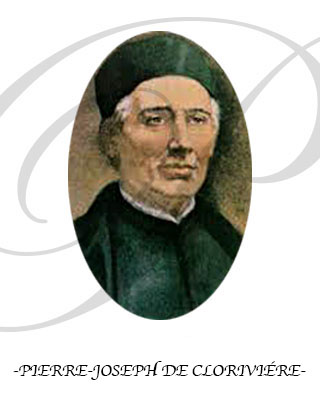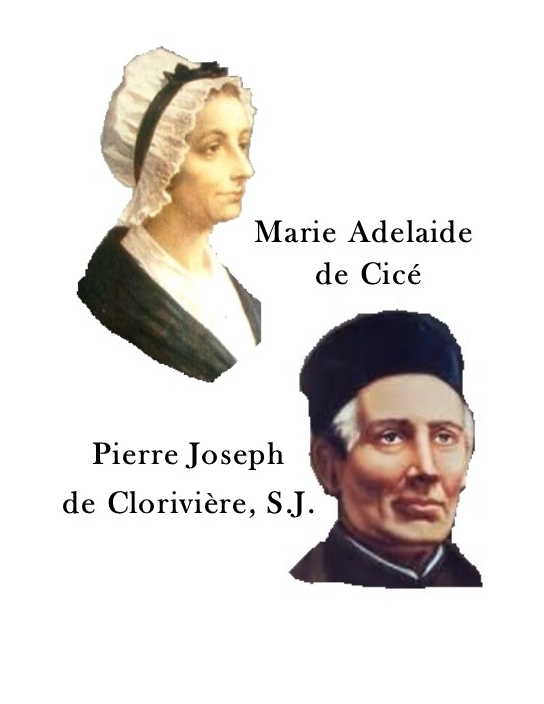Servant of God Peter de Cloriviere, SJ
Born : June 29, 1735
Died : Jan 9, 1820
 Fr Peter de Cloriviere was born at Saint-Malo, Brittany, France. He studied at the Benedictine school at Douai from 1749 to 1753. At eighteen he joined the navy but gave up after one year as he did not like the sailor’s life and decided to study law in Paris. There he met a diocesan priest who invited him to make a retreat. It was during those prayerful days that Peter experienced what he called his conversion – a growing interest in prayer and his increased love of God which invoked in him a great desire to receive Holy Communion daily, something unheard of during the 18th century. It was also during this time of grace that Peter first thought about the priesthood.
Fr Peter de Cloriviere was born at Saint-Malo, Brittany, France. He studied at the Benedictine school at Douai from 1749 to 1753. At eighteen he joined the navy but gave up after one year as he did not like the sailor’s life and decided to study law in Paris. There he met a diocesan priest who invited him to make a retreat. It was during those prayerful days that Peter experienced what he called his conversion – a growing interest in prayer and his increased love of God which invoked in him a great desire to receive Holy Communion daily, something unheard of during the 18th century. It was also during this time of grace that Peter first thought about the priesthood.
Peter’s only contact with the Jesuits in Paris was the occasional attendance of Mass at the church attached to their novitiate. On Feb 23, 1756, as he was leaving church, a lady, a stranger, said to him: “God is calling you under the protection of St Ignatius and St Francis Xavier. This is the novitiate. Enter it.” Peter went back into the church and prayed and when he left, he was convinced that God wanted him to be a Jesuit.
Six months later Peter entered the novitiate, took his vows two years later and began his study of philosophy. Because of his stuttering problem and as he was afraid that this might impede his ability to teach or preach as a priest, Peter decided to be a brother instead. However, his superiors insisted that he studied for the priesthood. He taught at Compiegne from 1759 until 1762 when the government closed all the Jesuit schools in France and expelled all Jesuits. Peter then went to the English College in Liege, Belgium, to study theology and after his ordination on Oct 2, 1763; he remained there to complete his studies.
Fr Cloriviere’s first assignment was in London. Because he was mysteriously ill with a sickness that lasted six months which affected his health, he was sent to Ghent, Belgium, as the assistant to the novice master, an important position but one physically less demanding. He was spiritual director of the English Benedictine nuns in Brussels until Pope Clement XIV dissolved the Society having acquiesced to the demands by various European monarchs to suppress the Society.
He returned to France in 1775, initially in charge of a monastery at Jarcy before becoming pastor at Parame on the Breton coast. Fr Cloriviere’s stuttering problem caused him great distress and humiliation but he persevered with his preaching. He stormed heaven for a cure and his prayers were answered one Sunday morning in 1780, when he began his sermon and found his stuttering gone. He remained at this parish until 1786 when the bishop appointed him director of the diocesan school at Dinan.
 With the coming of the French Revolution when the Church was persecuted, Fr Cloriviere found his priestly ministry curtailed at home. Thinking that he could work to restore the Society in the USA, he wrote to Bishop John Carroll of Baltimore, Maryland whom he knew as a student in Liege and asked to work in his diocese. He would have gone to the US if Providence had not had him change his mind as he reflected that he could labour for the Society’s restoration in his native France instead of from abroad. He remained in France and initiated the work that became his special apostolate. He founded the Society of Daughters of the Heart of Mary in 1790 and the Society of Jesus in 1791; both congregations had the aims and goals of the Society of Jesus. Fr Cloriviere devoted his life and efforts to these two groups, instructing the members in the principles of religious life and wrote their rules.
With the coming of the French Revolution when the Church was persecuted, Fr Cloriviere found his priestly ministry curtailed at home. Thinking that he could work to restore the Society in the USA, he wrote to Bishop John Carroll of Baltimore, Maryland whom he knew as a student in Liege and asked to work in his diocese. He would have gone to the US if Providence had not had him change his mind as he reflected that he could labour for the Society’s restoration in his native France instead of from abroad. He remained in France and initiated the work that became his special apostolate. He founded the Society of Daughters of the Heart of Mary in 1790 and the Society of Jesus in 1791; both congregations had the aims and goals of the Society of Jesus. Fr Cloriviere devoted his life and efforts to these two groups, instructing the members in the principles of religious life and wrote their rules.
When Fr Cloriviere heard that the Society still existed in White Russia (today’s Belarus) he wrote to the Russian superior asking for readmission into the Society, and was granted. However he was arrested in 1804 and was imprisoned on suspicion that he was involved in the Cadoudal conspiracy on Napoleon’s life in 1800. Fr Cloriviere was completely innocent but the authorities confused him with his nephew who bore the same name and had fled to the US. He was freed in 1809 when he was seventy-four.
When the Society was restored throughout the Church on Aug 7, 1814, Fr Cloriviere had sixty novices but it grew to 144 with two residences and five colleges within three years. As Fr Cloriviere was by then eighty-three, he asked to be relieved of the burdens of superior in order to prepare for death. He continued to live a simple life and was an inspiration to all.
On January 9, 1820, Fr Cloriviere woke up at 2.45 am as usual and spent the next hour meditating in his cold room. At 4.00 am he went to the chapel to make his adoration, kneeling at the communion rail. When the community came in at 4.30 am, the Jesuits discovered that their beloved father had died in prayer at his place before the Blessed Sacrament. Fr Cloriviere was eighty-five when he was laid to rest. His cause is presently under consideration in Rome.
